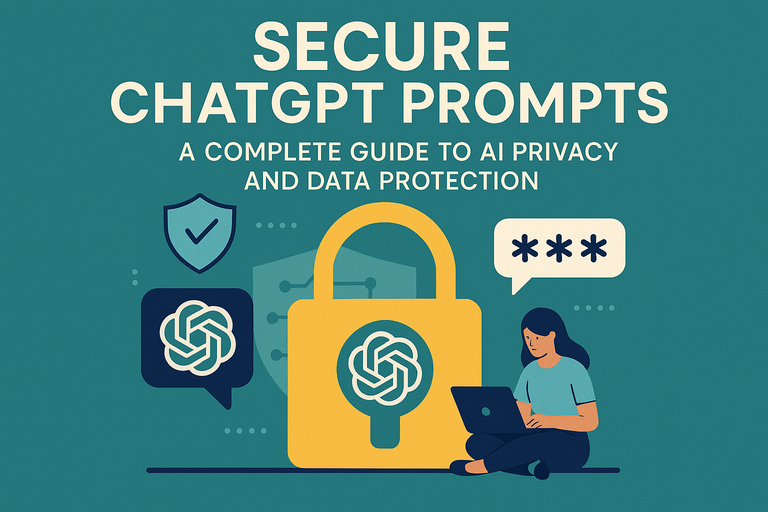
Secure ChatGPT Prompts: A Complete Guide to AI Privacy and Data Protection
Secure ChatGPT Prompts: A Complete Guide to AI Privacy and Data Protection
Estimated reading time: 12 minutes
Key Takeaways
- Grasp the essentials of secure ChatGPT prompts to safeguard sensitive data.
- Recognize common vulnerabilities and how to mitigate them effectively.
- Apply technical, procedural, and administrative AI security controls.
- Utilize encryption, anonymization, and secure storage for prompt data protection.
- Leverage prompt management tools and DLP integration for centralized oversight.
With nearly a billion users globally leveraging ChatGPT for various purposes, the need for secure handling of AI interactions has never been more critical. This exponential adoption spans across industries, from finance to healthcare, making secure ChatGPT prompts a paramount concern for enterprises worldwide.
As organizations increasingly integrate AI into their operations, protecting sensitive information while interacting with these powerful language models becomes essential. This comprehensive guide explores the critical aspects of AI prompt privacy and prompt data protection, providing enterprises with actionable strategies to safeguard their AI interactions.
Understanding Secure ChatGPT Prompts
Secure ChatGPT prompts represent the methodical approach to crafting and managing AI queries in a way that prevents exposure of sensitive information to the model or its logs. This practice is fundamental to maintaining enterprise AI security and protecting valuable business assets.
- Direct inclusion of personally identifiable information (PII) in prompts
- Inadvertent exposure of credentials or sensitive data
- Unauthorized access to stored prompts
- Accidental data leaks through prompt reuse
AI Prompt Privacy: Why It Matters
AI prompt privacy encompasses the comprehensive protection of inputs provided to AI systems. This aspect of security has far-reaching implications for business operations and compliance.
- Substantial financial losses
- Permanent reputation damage
- Heavy regulatory penalties
Regulatory Considerations
- GDPR requirements for data minimization and consent
- HIPAA compliance for healthcare-related data
- Industry-specific regulations governing AI usage
- Data protection standards across jurisdictions
Handling Confidential Data Prompts
Confidential data prompts require special attention as they contain sensitive information that could compromise business operations if exposed. Understanding the risks and implementing appropriate safeguards is crucial.
- Unauthorized access to stored prompts
- AI model retention of sensitive information
- Unintended regeneration of confidential content
Essential Mitigation Strategies
- Implement strict policies against direct PII input
- Develop standardized prompt templates
- Enforce robust access controls
- Regular security audits of prompt interfaces
Enterprise AI Security Best Practices
A comprehensive approach to enterprise AI security rests on three fundamental pillars:
Technical Controls
- Implementation of Role-Based Access Control (RBAC)
- Multi-factor authentication for AI platforms
- Secure API integrations
Procedural Controls
- Regular audit log reviews
- Real-time monitoring of prompt usage
- Incident response protocols
- Security breach notification procedures
Administrative Controls
- Comprehensive AI usage policies
- Regular employee training programs
- Cross-functional governance frameworks
Prompt Data Protection Techniques
Encryption Protocols
- TLS/SSL encryption for data in transit
- AES-256 encryption for stored data
- End-to-end encryption for sensitive communications
Anonymization and Masking
- Automated PII detection and removal
- Data masking algorithms
- Synthetic data generation for testing
Secure Storage Solutions
- Enterprise-grade security vaults
- Access control mechanisms
- Encrypted backup systems
Tools and Technologies for Enhancing AI Prompt Security
Prompt Management Platforms
- Centralized prompt control
- Template enforcement
- Usage tracking and analytics
- Approval workflows
DLP Integration
- Real-time content scanning
- Pattern matching for sensitive data
- Automated blocking of risky prompts
Emerging Technologies
- Confidential computing environments
- Federated learning systems
- Zero-trust AI architectures
Case Studies: Successful Implementation of AI Prompt Security
Case Study 1: Financial Sector
- Challenge: Preventing exposure of proprietary trading algorithms
- Solution: Encrypted prompt gateway with strict access controls
- Result: Zero security incidents and improved operational efficiency
Case Study 2: Healthcare Provider
- Challenge: AI-assisted diagnosis without PHI exposure
- Solution: Comprehensive anonymization and DLP implementation
- Result: HIPAA-compliant AI operations with enhanced patient care
Key Lessons Learned
- Importance of continuous security training
- Value of cross-departmental collaboration
- Need for regular security assessments
Conclusion
As AI adoption continues to accelerate, secure ChatGPT prompts have become essential for enterprise operations. Implementing robust AI prompt privacy measures and comprehensive prompt data protection strategies is no longer optional but a fundamental requirement for business success and regulatory compliance.
Call to Action
- Audit your current ChatGPT prompt workflows
- Implement the security measures outlined in this guide
- Consider partnering with AI security experts
- Adopt specialized prompt management tools
For more information on enterprise AI security and prompt data protection, contact our team of experts or download our comprehensive whitepaper on secure AI implementation.
FAQ
What are secure ChatGPT prompts?
Secure ChatGPT prompts involve carefully crafting and managing AI queries to prevent the exposure of sensitive information to the model or its logs, ensuring enterprise AI security.
How can organizations prevent PII exposure in prompts?
Implement strict policies against direct PII input, use standardized prompt templates, and deploy automated PII detection and masking tools to reduce the risk of sensitive data leaks.
Which encryption protocols are recommended for prompt data?
Use TLS/SSL encryption for data in transit and AES-256 encryption for stored data. For highly sensitive communications, consider end-to-end encryption solutions.
What regulatory requirements should I consider?
Ensure compliance with GDPR for data minimization and consent, HIPAA for healthcare data, and any industry-specific regulations relevant to your organization’s jurisdiction.
What tools can enhance AI prompt security?
Prompt management platforms, DLP integrations, confidential computing environments, and zero-trust AI architectures are key technologies for strengthening prompt security.